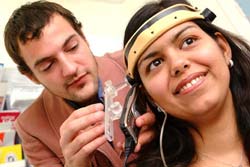Engineering and research-driven innovations in the field of communications are addressed here, in addition to business developments in the field of media-wide communications.
innovations-report offers informative reports and articles related to interactive media, media management, digital television, E-business, online advertising and information and communications technologies.

Scientists at the Institute of Sound and Vibration Research (ISVR) at the University of Southampton are nearing the end of the first phase of a study to assess whether the use of mobile phones has any adverse effect on the hearing of healthy young adults.
The study into Potential Adverse Effects of GSM Cellular Phones on Hearing (known by the acronym GUARD) is part of a joint European project funded by the European Commission being carried out simultaneously in several countries across Europ

Using phone numbers, remote controls and computer keyboards will likely seem quaint within a decade as new capability to turn human speech into accurate, efficient computer code radically changes the ways we live and work.
That’s the outlook of Lawrence R. Rabiner, associate director of the Center for Advanced Information Processing (CAIP) at Rutgers, The State University of New Jersey, in an overview of speech processing, “The Power of Speech,” in the journal Science, available Friday

Seeing really is believing
“Virtual product demonstrations that allow individuals to interact with merchandise create more vivid mental images of the consumer using the products, thereby increasing the likelihood they’ll purchase the item,” said Ann Schlosser, UW Business School assistant professor of marketing.
“We’ve found that the more easily individuals can envision themselves using a product, the more likely they are to buy it.”
Schlosser studied how consumer

Innovative students and professors at the University of Rochester have created a navigational assistant that can help inform a visually impaired person of his whereabouts, or even bring new dimensions to museum navigation or campus tours for sighted individuals. The system, nicknamed “NAVI” for Navigational Assistance for the Visually Impaired, uses radio signals to gauge when someone is near passive transponders that can be as small as a grain of rice and located on the outside of a building, on a s

In a recent study that examined perceptions of gays and lesbians by others, Kansas State University psychology professor Richard Harris asked one group of people to think of a positive gay or lesbian character from a television show or movie and asked another group to think of a negative gay or lesbian character from media. A third group, the control group, was asked to think about an unmarried media character, but sexual orientation was not mentioned. All three groups were then asked to complete a p

Contrary to popular belief, using the Internet may not improve a person’s chances of finding a job.
That surprising finding will be presented Tuesday (Aug. 18) during a session on economic sociology at the annual meeting of the American Sociological Association in Atlanta by Christine Fountain, a University of Washington doctoral student.
“The punch line is everyone thinks the Internet is a great new way to help people find a job. But it really is not,” said Fountain,